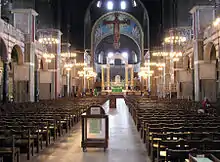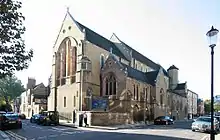
John Francis Bentley (30 January 1839 – 2 March 1902) was an English ecclesiastical architect whose most famous work is the Westminster Cathedral in London, England, built in a style heavily influenced by Byzantine architecture.[1]
Life

Bentley was born in Doncaster. In 1839, he was associated with the firm of Holland & Hannan. He was an apt modeller and had tried his hand with success at stone carving. He studied under Henry Clutton before branching out on his own in 1868.[2]
His first important commission was from Cardinal Manning, for the seminary at Hammersmith. Examples of his work include Holy Rood Church, Watford, St John's Beaumont School, Corpus Christi Church, Brixton, St Mary's, Cadogan Street, Chelsea (1879), the high altar at St Gabriel's, Warwick Square,[3] and St Luke's Church, Chiddingstone Causeway (1897),[4] and the Sacred Heart Chapel at the Jesuit Church of the Immaculate Conception, Farm Street.[2] Though much of his work was in the neo-Gothic style, he was selected to create a Byzantine Revival design for Westminster Cathedral.[5]
The great opportunity of Bentley's career came in 1894, when he was commissioned to design a new Roman Catholic cathedral in Westminster, London. After deciding on a Byzantine Revival design, Bentley travelled to Italy to study some of the great early Byzantine-influenced cathedrals, such as St Mark's Basilica in Venice. Because of illness and an outbreak of cholera in Istanbul, he was unable to complete his tour with a study of the Hagia Sophia. Bentley ended his tour in Venice and returned to London to begin work on Westminster Cathedral.[6]
George Williamson describes him as a person of brusque, reserved manner, but kind and friendly to those who knew him. He had the strongest dislike to the preparation of show drawings and to the system of architectural competition and, being a man wholly lacking in self-assertion, and reticent in conversation, was never as well known in general circles as he deserved to be. His great characteristics as an architect were his careful attention to detail, his solicitude that all the fittings should be in perfect harmony with the building.[2]
In 1874 he married Margaret Annie Fleuss; they had 4 sons and 7 daughters. Their house in Clapham has a blue plaque.[7]
Bentley was awarded the gold medal of the Institute of Architects in February, 1902, but never received it, as on 1 March he was seized with paralysis and died the following morning in Clapham. He is buried at St Mary Magdalen Church, Mortlake.
Architectural work
 Westminster Cathedral, interior looking east
Westminster Cathedral, interior looking east Westminster Cathedral, Chapel of the Blessed Sacrament
Westminster Cathedral, Chapel of the Blessed Sacrament Westminster Cathedral, The Baptistry
Westminster Cathedral, The Baptistry Westminster Cathedral, The Lady Chapel
Westminster Cathedral, The Lady Chapel Westminster Cathedral, The Sanctuary
Westminster Cathedral, The Sanctuary Westminster Cathedral, The Shrine of the Sacred Heart and St Michael
Westminster Cathedral, The Shrine of the Sacred Heart and St Michael

 Church of the Immaculate Conception, The Sacred Heart Chapel
Church of the Immaculate Conception, The Sacred Heart Chapel
 St Gabriel's Church, Warwick Square, Sanctuary
St Gabriel's Church, Warwick Square, Sanctuary
 Chapel Of The Immaculate Conception, Franciscan Convent
Chapel Of The Immaculate Conception, Franciscan Convent The interior of Church of Our Lady of the Assumption and St Gregory, Soho
The interior of Church of Our Lady of the Assumption and St Gregory, Soho
Also St Francis of Assisi London W11
Notes
- ↑ "BENTLEY, JOHN FRANCIS". History Website for Dibdin, Aglio, Rowntree, Guise, and other Families.
- 1 2 3 Williamson, George. "John Francis Bentley." The Catholic Encyclopedia Vol. 2. New York: Robert Appleton Company, 1907. 5 June 2019
 This article incorporates text from this source, which is in the public domain.
This article incorporates text from this source, which is in the public domain. - ↑ Historic England. "CHURCH OF ST GABRIEL (1357369)". National Heritage List for England. Retrieved 4 September 2016.
- ↑ Homan, Roger (1984). The Victorian Churches of Kent. Chichester: Phillimore & Co. Ltd. p. 105. ISBN 0-85033-466-7.
- ↑ Townsend, Charles Harrison (1922). . Encyclopædia Britannica (12th ed.).
- ↑ Paul Waterhouse, Bentley, John Francis (1839–1902), rev. Peter Howell, Oxford Dictionary of National Biography, Oxford University Press, 2004 accessed 31 Jan 2011
- ↑ Johnson, Derrick (16 February 2018). "The Clapham Society Local History Series — 36 John Francis Bentley". The Clapham Society.
References
- Herbermann, Charles, ed. (1913). . Catholic Encyclopedia. New York: Robert Appleton Company.
- Philip's Encyclopedia Comprehensive Edition 2008. Octopus publishing Group. 2007. p. 147. ISBN 978-0-540-09151-5.
External links
- John Francis Bentley at Find a Grave
- Winefride de L'Hôpital, Westminster cathedral and its architect Volume 1 (1919) (This volume is written by Bentley's daughter and is about the design and construction of the Cathedral)
- Winefride de L'Hôpital Westminster cathedral and its architect (1919) Volume 2 (This is Volume 2 of the biography written by Bentley's daughter and deals with his early life and works other than Westminster Cathedral)